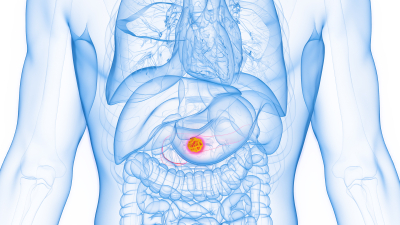
New Brunswick, N.J., November 1, 2025 – It’s not unusual for cysts—balloon like pockets filled with fluid— to form in the pancreas, an important organ that produces enzymes that help digest food. A majority of pancreas cysts are benign, although some are considered pre-cancerous and are the most common identifiable precursor to pancreatic cancer. Unlike other cysts such as those on the ovaries, liver or kidneys, some pancreatic cysts do have the potential to progress to pancreatic cancer over time.
Pancreatic cysts are frequently found during an imaging scan for something else. They typically do not have any symptoms. Once identified, patients and doctors are encouraged to refer to pancreatic care teams where the characteristics of the cyst, pancreas, family history and other risk factors can all be assessed by a pancreas multidisciplinary team to risk stratify the cyst.
When pancreatic cysts are followed and surveyed appropriately, intervening at appropriate times can reduce the risk of developing pancreatic cancer. Physicians can make an impact on prevention immediately among people who have an increased risk of developing pancreatic cancer or detect the disease early when it is in an early stage.
Cooperman Barnabas Medical Center, in partnership with EON health, has pioneered one of the first cloud-based data management platforms in the nation to identify, track and monitor patients with pancreatic cysts. The artificial intelligence software being used identifies patients automatically if they have an abnormality in their pancreas. Through the program, patients are identified and offered consultation with our pancreas care team. In doing this, the appropriate evidence based follow-up imaging or endoscopy is performed regularly to monitor the cysts and the surrounding pancreas.
This technology allows patients and their physicians the ability to understand their risk for the development of pancreas cancer. Since pancreatic cysts rarely produce symptoms, patients can be living normal lives in the community, unaware of their risk. This software allows identification and direct communication to the patient and their physicians to inform them of their potential risk and offer consultation with a pancreatic specialist and our care team.
Everyone should know their risk. A history of smoking, diabetes and chronic pancreatitis and obesity are risk factors for developing pancreatic cancer. Further, the risk of pancreatic cancer is higher if there is either a family history of pancreatic cancer or a history of certain genetic syndromes.
Russell Langan, MD, FACS, FSSO is a surgical oncologist at the Jack & Sheryl Morris Cancer Center, Rutgers Cancer Institute and RWJBarnabas Health, the state’s leading cancer center and only NCI-designated Comprehensive Cancer Center. Dr. Langan is also director of surgical oncology, Northern Region, RWJBarnabas Health and chief of Surgical Oncology and Hepatopancreatobiliary Surgery at Cooperman Barnabas Medical Center.
To learn more and schedule an appointment, visit rwjbh.org/cyst.
###
For journalists – contact:
Krista Didzbalis
Media Relations Assistant
732-507-8307
krista.didzbalis@rutgers.edu
For patient appointments/inquiries – contact:
844-CANCERNJ (844-226-2376)

